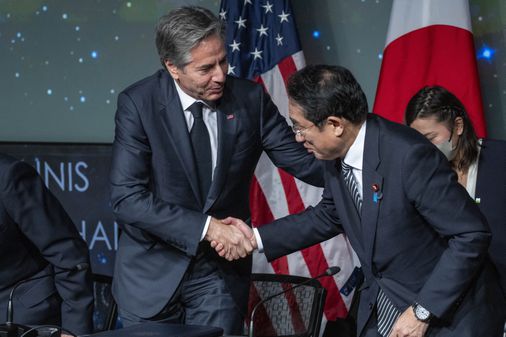“We’re modernizing our military alliance, building on Japan’s historic increase in defense spending and new national security strategy,” Biden said as the two leaders sat in the White House Oval Office in front of a fireplace with a roaring blaze. “Let me be crystal clear: The United States is fully, thoroughly, completely committed to the alliance.”
WASHINGTON — President Biden and Prime Minister Fumio Kishida of Japan met Friday to discuss how to transform Japan into a military power as both nations grapple with growing challenges from China, and to work on bolstering the alliance between the two nations as the linchpin for strengthening their security in Asia.
Advertisement
Kishida is making his first trip to Washington since his election in October 2021 and one month after his government announced plans to strengthen its military capabilities and significantly increase military spending in the face of China’s rising power and repeated missile tests by North Korea.
Japan was infuriated by China’s lobbing of missiles around Taiwan in August, five of which landed in waters near Japan, the first time that had happened. And Japan is increasingly anxious over greater maritime activity by the Chinese military in the East China Sea and around the Senkaku Islands, which is disputed territory between the two governments.
Kishida said his administration had decided to take major steps aimed at “fundamentally reinforcing our defense capabilities,” including increasing military spending and growing the nation’s missile strike abilities.
“I believe that this will be beneficial for the deterrence capabilities and response capabilities of the alliance as well,” he said.
Biden greeted Kishida on the South Lawn of the White House before noon, shortly after Kishida finished breakfast with Vice President Kamala Harris at her residence at the US Naval Observatory.
Before flying to Washington, Kishida had met with European, British, and Canadian leaders in their countries and signed a defense agreement in London. He said in Tokyo before the global tour that he would stress the need for cooperation, given the world was “now in a severe security environment” and that “the global economy is also facing the possibility of downside risk.”
Advertisement
Besides military issues, Biden, Kishida, and their aides were expected to discuss the close economic ties between the two nations and the challenges in maintaining secure global supply chains. The security issues tied to commerce include technology trade with China, the world’s second-largest economy, and sanctions against Russia for its war on Ukraine.
Biden has made the bolstering of alliances across Europe and Asia a cornerstone of his foreign policy, in contrast to the “America First” direction of his predecessor, Donald Trump. Biden sees the alliances as critical in the face of greater aggression by China and Russia, the main superpower rivals of the United States, and views with growing urgency global issues such as the coronavirus pandemic, a food crisis, climate change, and nuclear proliferation.
Biden has also stressed the importance of supporting democracies against internal and external threats, and he and his aides count Japan among the most important democratic governments in Asia.
The summit Friday follows a meeting Wednesday between Secretary of State Antony Blinken, Defense Secretary Lloyd Austin, and their counterparts, Yoshimasa Hayashi and Yasukazu Hamada of Japan.
US and Japanese officials said Wednesday that the two nations would expand their military cooperation, including by improving what the governments call Japan’s missile counterstrike capabilities and making the US Marine unit in that country more flexible for potential combat. Japan has said it plans to buy hundreds of US-made Tomahawk cruise missiles. At the moment, Britain is the only US ally with the missiles.
Advertisement
The changes come as both countries perceive more threatening behavior from China, North Korea, and Russia, which have decadeslong partnerships.
Under the new US deployment arrangement in Japan, those who are serving in Okinawa as part of the 12th Marine Regiment, an artillery unit, will transform into a more mobile group: the 12th Marine Littoral Regiment. The new configuration will allow the troops to more easily fan out to other islands along the coast when needed, US officials said.
The littoral regiment will have about 2,000 troops total, and have long-range fire abilities that can hit ships. Austin said the change would lead to a presence that is “more lethal, more agile, more capable.”
The agreement will not increase the number of Marines serving in Okinawa, officials said. Pentagon officials said the restructuring is partly to deal with China’s growing military activity and presence, including around the island of Taiwan, a self-governing democracy that the Chinese Communist Party intends to bring under its rule.
Last month, the Kishida administration released a new national security strategy in which Japan committed to spending 2 percent of its gross domestic product on its annual defense budget, a substantial increase.
Biden and Kishida to bolster US-Japan alliance amid China’s growing power
RELATED ARTICLES



